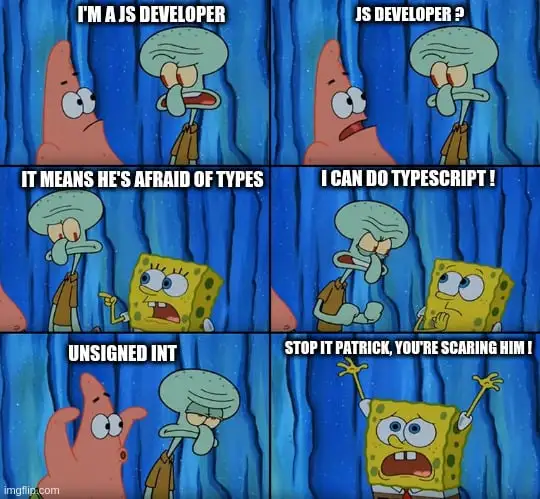this post was submitted on 13 Jul 2023
445 points (98.3% liked)
Programmer Humor
32503 readers
418 users here now
Post funny things about programming here! (Or just rant about your favourite programming language.)
Rules:
- Posts must be relevant to programming, programmers, or computer science.
- No NSFW content.
- Jokes must be in good taste. No hate speech, bigotry, etc.
founded 5 years ago
MODERATORS
you are viewing a single comment's thread
view the rest of the comments
view the rest of the comments

Yep, I always default to the largest possible type because compute is less valuable than my time on the weekend and the potential for any sort of overflow.
Long
Double
Big int
Etc.
I don't know if I'd go that far. If you're talking about a quick script then sure, whatever gets the job done. But for any actual project the use of good, consistent typing does a lot for readability and future-proofing. And in strongly-typed languages it can have a notable affect on the overall functionality too.
If you can't tell from context whether something is a float or if it'll overflow the int max then you probably need to re-think the entire method.
why not just compile with overflow checking? assuming the number should not reach the limits
The compiler doesn't know what numbers are going to go into a variable, that's a runtime thing. They might prevent a crash that way, but a crash or not doesn't matter when people need the number in the database and the database doesn't let you put the number in the database.
i mean, at least with rust, running in debug mode (or release with flags) will hard panic if an overflow occurs, bc it checks everytime a number is changed. it is obviously less performant to do this, so it does not check when running in release/production mode. the problem is if you need to have no overflows occur, it is better to throw an error and exit the program, than cause unexpected behaviour, eg. as an incorrect, but existing array item. this could be hard to find the cause of the bug if it doesnt throw
I'm a C# dev so I forget that anything that's not this case even exists. Agreed 100 percent.